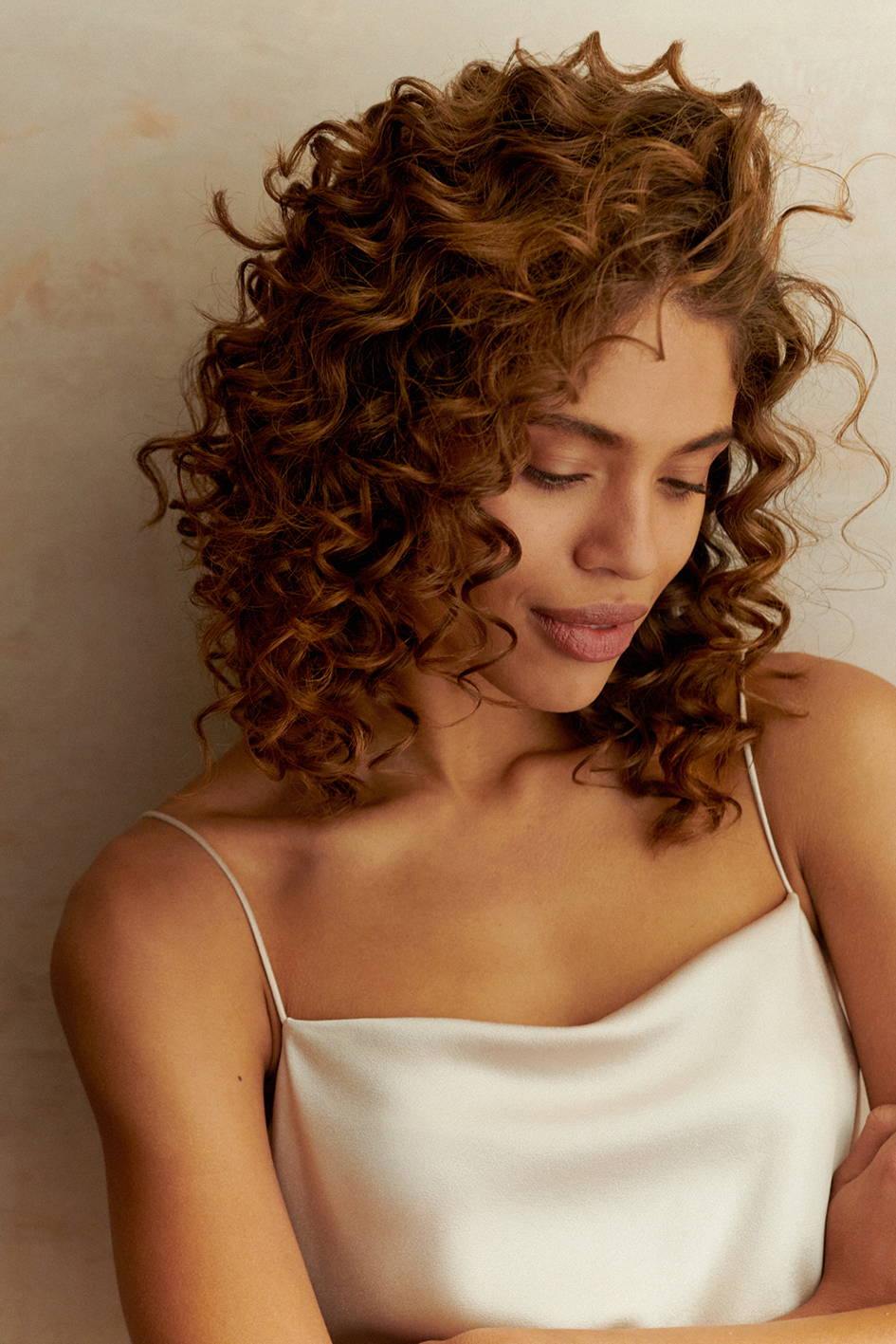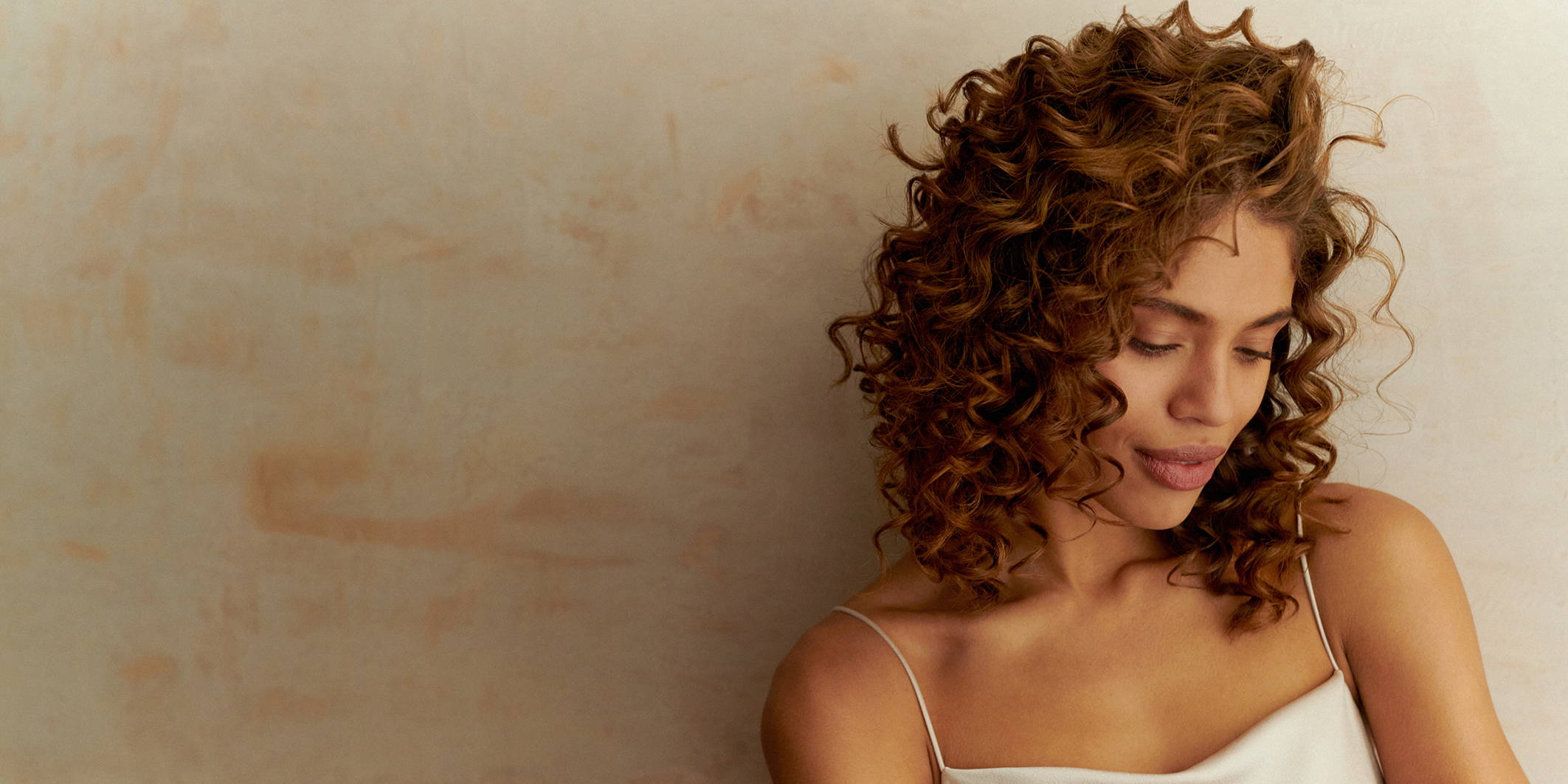

If you aren't already acquainted with the trend, let us clue you in.
Anyone on the hair care side of social media will have likely seen the videos of try-anything trendspotters wrapping their locks in socks and bonnets overnight to wake up with silky, bouncy curls. Maybe you've even tried the inventive (if not slightly funny-looking) hack and already consider yourself a "hair slugging" believer.
The "slug" in "slugging" — a term also used in skincare — describes the appearance of hair or skin once it's been properly shellacked with a hydrating product. With hair slugging, the tubular shape created by wrapping hair in a sock or scarf before bed adds to the sluglike aesthetic. There are a few ways to go about the technique, but the idea behind hair slugging is always to moisturise the strands with a layer of oil and/or conditioner, then lock that moisture in by wrapping it overnight.It's particularly beneficial to dry and frizzy hair types, including curly, coily, andkinky textures. If that's you, you know how difficult textured hair can be to manage. This hair care ritual pumps strands with moisture and nutrients, leaving it hydrated, highly elastic, and easy to comb through in the morning.
Read on for more on hair slugging: how to do it, when to do it, and more ways to enhance curl definition.

All you need to try the hair slugging trend is a quality oil, serum, or leave-in conditioner and something to wrap the hair in, be it a sock, scarf, bonnet, shower cap, or plain old plastic wrap. A hair scrunchie will help you secure the wrap while you sleep.The process is ridiculously simple. As with most treatments, it starts with freshly washed hair.
A balanced scalp should be washed every three or four days, but you might have to shampoo more or less frequently if you suffer from excessive oil (wash up to once a day) or dryness (wash once a week). Regardless, it's important to get the scalp thoroughly clean on wash days to prevent product build-up, which could become the source of your problems. In addition to your everyday shampoo, you should also incorporate scrubs and regular detoxes into your care regimen.
Slugging is typically done with an oil or serum, but you could also use a high-quality leave-in conditioner if you struggle less with dryness and find oils to be too heavy and greasy. Generally, the dryer and frizzier your hair type, the heavier a product it can handle. Apply a generous amount — remember, you're aiming to achieve a sluglike sheen — massaging the product into the scalp and strands from roots to ends. Skip the roots altogether and start mid-shaft if you have a naturally oily scalp or easily accumulate build-up.
Some swear that a fuzzy sock is best for hair slugging for two reasons: It reduces friction while you sleep while also adding bounce and texture as the sock comes in contact with your hair. We say any clean tube sock, bonnet, shower cap, or plastic wrap will do the trick. If you opt for the sock, your roots will remain exposed; just give your slicked-up ends a gentle twist and slide them into the sock, securing it at the top with a scrunchie. If you're using a bonnet, cap, or plastic wrap, cover up to the hairline to reap scalp benefits. The wrap works as an occlusive does on the skin, creating a barrier to seal the moisture in.
In the morning, rinse out the product from your hair in lukewarm water. Once you get the slickness out, it's best to expose the strands to a burst of cold water, which helps seal the cuticle and lock the product in.
Hair slugging is a great technique for defining and moisturising curls, but there are ways to go about it that are better than others. For example, leaving the product in your hair overnight yields better results than leaving it in for only an hour, although you can opt for the latter for slight improvement in a shorter amount of time. Also, failing to rinse the product fully from your hair after slugging can lead to build-up on the scalp and, potentially, clogged pores. Once you have the technique down, maintain your texture with a curl-safe routine. Co-washing, for example, takes shampoo out of the care equation so the hair can retain moisture. Here are some other tips and tricks for achieving perfect curls. SOLU or DETOXIFYING are also good options to remove residue and cleanse the scalp from excess products – reducing the risk of clogged pores.
The curly-haired can't — or shouldn't — just go around using products meant for straight hair. Rather, you want extra-hydrating products for the additional dryness and frizz, plus formulas that contain curl activators.
Neglecting the back of your head or the undersides of your hair will almost definitely lead to inconsistent curls. Rather than applying product all over, separate the hair into sections and focus on smaller areas.
Ever heard of SOTC, aka "scrunch out the crunch"? The SOTC method relies on "scrunching" — cupping and squeezing the curls — after applying styling product to create shape, volume, and definition. Scrunching can be done with a cotton shirt (ideally not a towel, which can create frizz) or your hands.
Once you're happy with your style, try to avoid touching it while it finishes drying and for the rest of the day. The more you agitate it, the frizzier it will become.
Slugging alone can work wonders on wavy and curly hair types, but factoring in more advanced techniques like "finger coiling," "pineappling," diffusing, and mixing products can take your curl care routine to the next level. Here are some secrets to ultimate definition.
Hair products, like clothes, are rarely one-size-fits-all. Often, you'll need to mix and layer them to address different struggles or optimise in different ways. When layering, general rules to follow include applying care products to damp hair and styling products to dry hair, and applying products in the order of lightest (gels, mousses) to heaviest (oils).
Finger coiling is a technique that improves the curl pattern. It entails twisting small sections of wet hair, ideally with a styling product already applied, around your finger to create artificial curls that match your natural texture.
Don't neglect the diffuser attachment that comes with your hairdryer. This bowl-shaped accessory spreads the airflow over a wider area so it doesn't blow the curls out of shape and, inevitably, into an unkempt poof.
Contrary to what you'd expect, overnight "pineappling" doesn't mean using the tropical fruit as a hair mask. Rather, this method is called such because of the shape the hair creates when it's piled atop your head for sleeping. Flip your head upside down and secure the hair into a high ponytail with a silk scrunchie. The hair will appear to sprout from your crown like the plumb leaves of a pineapple. This protects the curl pattern overnight.

Not at all! Slugging works for all hair types. Although the technique delivers major benefits to curls, it can also greatly improve dryness and frizz when used on straight hair. The exact process might look slightly different for each hair type..
Lightweight oils and hair masks are best for thin hair (to avoid weighing it down), and heavy oils and deep conditioning treatments are better for fully saturating thick hair. OI Oil is lightweight and multifunctional, adding shine while detangling and fighting frizz.
Anyone can reap the rewards of hair slugging any time of year, but there are certain seasons in which the technique is optimal. Summers are harsh on hair because of the sun exposure and heat, and if you live in a place with low humidity, you should certainly use hair slugging to restore moisture back to your tresses. Winter, too, is notoriously dry, always exacerbating frizz and static. Slugging once a week — or every few days if you have thick, very dry hair — can help you combat those winter hair woes all season long.
Hair slugging is not just a fleeting social media trend but a seriously valuable technique to add to your weekly hair care routine. Enjoy luscious, healthy, and hydrated hair even in the harshest of climates — and if you don't get the results you want, book an appointment with a Davines expert to discuss in-salon moisturising treatments.
Read more!